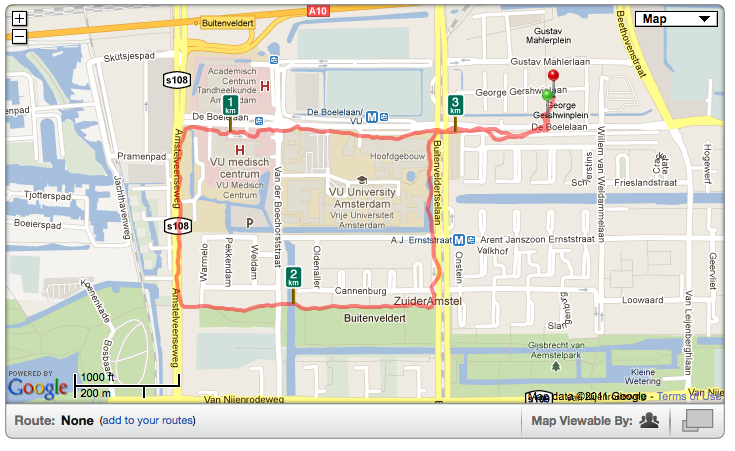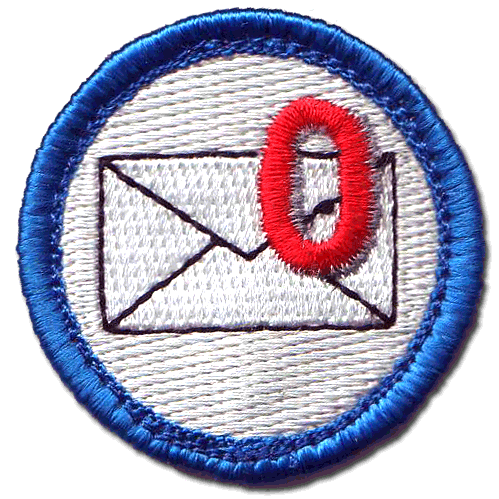
The power of habits
Although I like variety and change, I am also a big fan of well established habits. Part of my time is spend on daily, weekly or annual habits. Examples:
Daily: meditating (with Headspace). A cold shower. No meat. Seven hours sleep.
Weekly: 3-4 times running, total at least 30K.
Bi-weekly: Ajax home match (during the season).
Annually: Certain runs (like the Posbankloop and the Zevenheuvelenloop). A couple of weeks in the sun during the winter.
Habits at work
Habits can be powerful, also at work. Some suggestions:
1. Lunch walk
Easy to do, good for your health. Go for a lunch walk in stead of eating a fat lunch. For those who work in or near the Symphony building in Amsterdam Zuid I once created an overview of 10 lunch walks (Symphony Lunch Walks).

2. Inbox empty

I have hardly even received this goal, but still I am convinced this is a worthwhile practice. I one worked with a CFO who really mastered this practice. He looked at his inbox only a couple of times per day, and then took immediate action. He either answered the mail, delegated a task to one of his people, moved the mail to the waste basket or stored it for later action. The impression you got: this man is fast and very well organised. A good image for a CFO.
3. Weekly stand-up
If you use an agile methodology like Srum or not, a weekly stand-up meeting with your team can develop into a practice that is very much appreciated. Monday morning, 8.30 weekly stand-up. 30 minutes with a short update from your side (what are your priorities for this week?), and asking people where they need help this week. Good luck and off you go.
4. Walk around the office
If walking around the office once per day is not a habit, it will look strange if you do it for the first time. What is she doing here? Is something wrong? If you do it daily, you and the people will get use to it. You will find out is saves you a lot of time. Many short questions can be asked during your daily round, and you get a better idea what is going on. This practice is useful for everybody, not only leaders.
5. Clean Desk
On of my first job was in an organisation that worked a lot for the military. Confidentiality was very important. Clean desk was the rule, and if your desk was not empty at the end of the day, disciplinary measures would follow. I worked six years in this organisation, and this practice has always stuck to me. “A clean desk shows a clean mind” was the slogan, although others said “A clean desk shows an empty mind…”.
6. Daily compliment
A long time ago I was involved in assessment centers for accountants. One of the exercises was a role play, where the participants had to meet with an unhappy client. The client had a long list with issues, and the assignment was to write a short follow up memo after the meeting (“As this is the last meeting before your holiday, please write a memo or memos for your team, so that things can move on during your holiday”). The client was unhappy about many things, but she mentioned one thing positive: “Carl in your team is fantastic, he is the only one who always helps me immideately”. We did many many many assessments, but no-one ever wrote a memo to Carl, passing on the compliment. The negative issues got all the attention.
7. Leave your boss alone Thursday
From now on, leave your boss alone on Thursdays, and maybe Tuesdays as well. She will appreciate this, and it will develop into a habit that will help you to develop your independency.

8. Read one work related article per day
You want to read more but you can never find the time. Reading one article per day or one chapter of a book might help to move you in the right direction. Early morning is a nice time to do this. Mark interesting ideas. If you read electronically, you can use Readwise to deepen your experience. Use Instapaper to collect articles you want to read later.
9. Connect to a new person
By circling around between the people you already know and feel comfortable with, you might not get enough new ideas and fresh insights. Meet some new people, for example the friends of your friends or people your colleagues recommend. Once per week or once per month meeting someone new must be achievable.
10. Share one idea/thought/insight per day
Other people can benefit from your insights and ideas. Sharing at least one post per day, for example via LinkedIn, Slack or your internal media, can help to establish your profile as a professional or even thought leader.
Establishing habits
Establishing new habits, or getting rid of old habits, is not easy. There is loads of literature about this. The very short summary: forget will power, but invest in creating the conditions that will help you to establish the new habits. Lunch walk: ask a colleague to collect you three timed per week for a walk. Giving at least one compliment per day: put a reminder in your calendar.
It also helps to build strings of routines, like: open computer, go to task list to review daily tasks, give someone a compliment, walk around the floor and get a cup of coffee (or water), empty your inbox while drinking your coffee and you are ready for the day.







